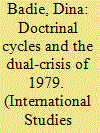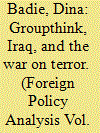| Srl | Item |
| 1 |
ID:
105240


|
|
|
|
|
| Publication |
2011.
|
| Summary/Abstract |
Though presidential doctrines claim to be broad, forward-looking articulations of national security principles, they are in fact reactive and narrow. They emerge following crises and can subsequently constrain security policy, creating ideal conditions for new crises to emerge. This paper thus argues that in the pursuit of security, presidential doctrines can perpetuate a cycle of instability. Using the Nixon Doctrine as the present case study reveals that the strategy first came as a response to the failure in Vietnam, then rendered the US unable to foresee or manage the events of 1979: the Iranian Revolution and the Soviet invasion of Afghanistan. These crises subsequently forced a wholesale reassessment of security in the form of the Carter Doctrine. In examining this period of US-Middle East relations, the constricting, reactive nature of doctrines and the concomitant cycles of instability become self-evident.
|
|
|
|
|
|
|
|
|
|
|
|
|
|
|
|
| 2 |
ID:
099754


|
|
|
|
|
| Summary/Abstract |
Existing scholarship on the Iraq War decision-making process generally treats the event as a logical extension of pre-existing ideas and policies. This paper considers the Bush administration's decision to absorb Iraq into the broader War on Terror as a deviation from long-held views of Saddam Hussein. I argue that the decision to incorporate Iraq into the wider post 9/11 mission was pathologically driven by groupthink, which caused a shift in the administration's view of Saddam from a troubling dictator to an existential threat to US security. Therefore, groupthink can simultaneously explain the defects in the decision-making process and the shift from cautious restraint to accelerated urgency with respect to US relations with Iraq.
|
|
|
|
|
|
|
|
|
|
|
|
|
|
|
|
| 3 |
ID:
100262


|
|
|
|
|
| Publication |
2010.
|
| Summary/Abstract |
Existing scholarship on the Iraq War decision-making process generally treats the event as a logical extension of pre-existing ideas and policies. This paper considers the Bush administration's decision to absorb Iraq into the broader War on Terror as a deviation from long-held views of Saddam Hussein. I argue that the decision to incorporate Iraq into the wider post 9/11 mission was pathologically driven by groupthink, which caused a shift in the administration's view of Saddam from a troubling dictator to an existential threat to US security. Therefore, groupthink can simultaneously explain the defects in the decision-making process and the shift from cautious restraint to accelerated urgency with respect to US relations with Iraq.
|
|
|
|
|
|
|
|
|
|
|
|
|
|
|
|